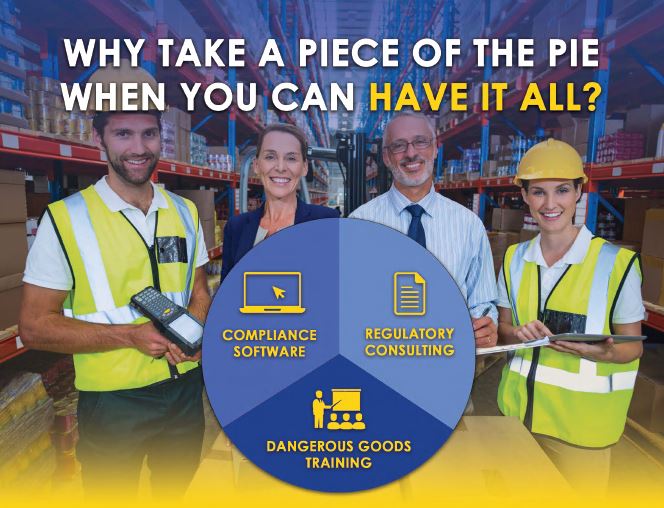
A work environment centered on the transportation of hazardous materials is certainly different from a work environment focused on sales or high finance, but it is a work environment nonetheless. Hazmat employers need to not only make sure that safety standards are being met across every step of the process, but that their work culture is positive and their employees’ needs are met. In the era of COVID-19, adhering to these standards is more important than ever. Building a better hazardous materials shipping and handling culture and incorporation online hazmat multimodal training for transportation employees in the post-COVID-19 world is paramount to prioritize safety and facilitation of hazardous materials transportation.
In fact, many experts believe that the pandemic mitigation strategies employed at the present might become permanent fixtures of our culture and become the ‘new normal’. Here are some of the steps that hazmat transportation companies can take in a post-COVID-19 world to change their work culture for the better.
Increased Protection for Frontline Workers
It goes without saying that hazmat employees who work on the frontlines are exposed to a variety of hazards on a day-to-day basis. As the COVID-19 outbreak showed, not providing frontline workers with the protective equipment they need can have serious consequences. So, employers must make sure that their hazmat employees have all the personal protective equipment and adequate online hazmat multimodal training to do their job in a safe and effective manner.
Adopting New Technology
Employers can adopt web-based technologies to simplify compliance processes and reduce the need for human intervention wherever possible. For instance, in-person training can be replaced with online training or webinars. Similarly, physical training records can be replaced with digital records. These measures can not only mitigate the spread of a disease or infection in the workplace, but also save money for the employer.
Encouraging Employees to Adopt Safe Work Practices
Hazmat shipping is a process where even the slightest of mistake can result in serious consequences. So, employers must encourage all hazmat employees involved in the process to adopt safe work practices.
Hazmat Training for Employees
Even in a post-coronavirus world, the best way to reduce the risk of hazmat incidents is to make sure each and every one of your hazmat employee is properly trained and fully knowledgeable about the nature of their work, the risks they face, and the regulations that they ought to comply with.
Involve Employees in COVID-19 Safety Support
Sometimes, transportation employees feel that their role is separate from that of their upper management. This may cause them to feel that they are not as important as the higher-ups. Of course, this is not true: the task of maintaining safety transportation and compliance standards is not just the duty of management, but of everyone involved in the transportation of hazardous materials, and every role is vital. However, this perceived imbalance can be demotivating.
The Pipeline and Hazardous Materials Safety Administration’s (PHMSA) “A Guide to Developing a Hazardous Materials Training Guide” advises managers to help “develop a supportive safety culture” by encouraging employees to be active with brainstorming and proposing ideas for improving the company’s shipping and handling procedures. Employers must also create a safe atmosphere in the sense that their employees feel free to interface with them about anything, without worrying about the threat of repercussions. That includes being open enough to report errors and issues, particularly against other managers.
Lead the Way
No one should be above the rules (especially because breaking those rules can cause a disaster), and no one should have the impression that accountability does not extend to “all management layers.”
Beyond this, employers must work with employees to fix problems and solve conflicts as they appear, and they must strive to prevent them from occurring. That can include conducting safety meetings, spot-checking the different departments, informing employees of any changes to regulations, and providing constructive criticism for performance evaluations. This advice can apply to any work environment, and it works just as well for companies that happen to be involved in hazardous materials shipping and handling.
Especially during Coronavirus pandemic, managers must lead by example to emphasize that they themselves are proudly adhering to the new infection-mitigation protocols and responsibilities that are expected of all individuals amidst the COVID-19 crisis, but for leadership, this is especially important.
Hazmat Training for Employees
Even in a post-coronavirus world, the best way to reduce the risk of hazmat incidents is to make sure each and every one of your hazmat employee is properly trained and fully knowledgeable about the nature of their work, the risks they face, and the regulations that they ought to comply with.
Online hazmat multimodal training programs are an excellent way to train hazmat employees who are involved in the storage, handling, and transportation of dangerous goods. These programs are affordably priced and can help hazmat employee’s gain an in-depth understanding of the regulations to be complied with. They can be accessed from anywhere and can be completed at a leisurely pace as well.
We’re here to help with regulatory technical support Monday-Friday from 8:30 AM – 5:00 PM EDT at no cost to you.
Need help selecting the right online hazmat training course for your training needs? Our modal and multimodal courses combine lessons containing the latest regulatory information with interactive exercises and quizzes to facilitate compliance with regulatory training requirements. Call us at (844) 532-7634 / (609) 860-0300 or contact us online, and we’ll be glad to help you!
